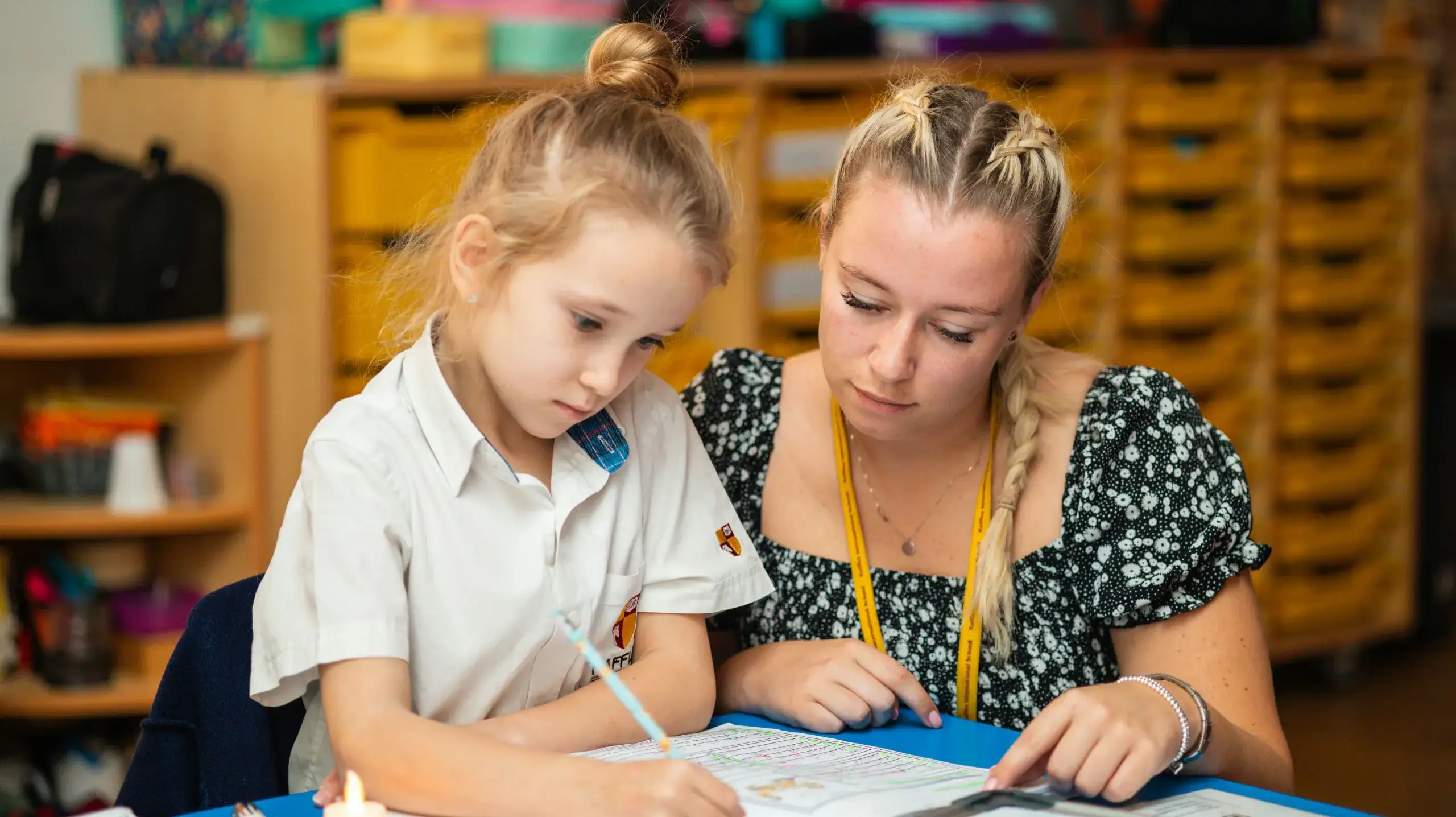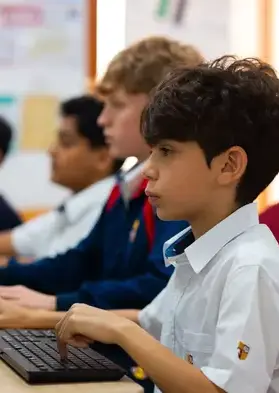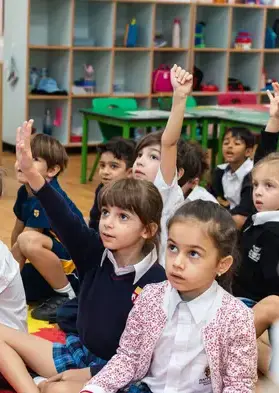questions about admissions at RIS?
For over 10 years, RIS has welcomed students from all over the world, many of whom had previously followed different curricula. We are proud of our visible commitment to diversity and international mindedness.
| WHERE IS RAFFLES INTERNATIONAL SCHOOL situated? |
|---|
| Raffles International School is located in the residential area of Jumeirah, Umm Suqeim 3 opposite to Burj Al Arab. |
| WHAT FACILITIES DOES RIS OFFER? |
|
RIS has school facilities catering for students from Nursery and above which include STEM labs in primary and secondary, art rooms, music rooms, computer labs, science labs, swimming pools, playing field, school library, cafeteria and a fully equipped medical clinic. |
| BRITISH SCHOOLS OVERSEAS INSPECTION (BSO) |
| Raffles International School is recognised (accredited by the UK Department for Education) as a school meeting the Standards for British Schools Overseas. This judgement is endorsed by the British Government and quality assured by the Office for Standards in Education (Ofsted) |
| BRITISH SCHOOLS IN THE MIDDLE EAST (BSME) |
| Raffles International School is accredited by BSME. British Schools in the Middle East (BSME) provides a quality-assured network of schools helping Teachers and Senior Leaders share best practice and keep abreast of the latest educational developments. |
| WHAT LANGUAGES ARE OFFERED AT RIS? |
|
In primary and secondary school, students study Arabic with either a choice of French, Spanish or Mandarin, starting in Year 3. Native Arabic speakers must study Arabic A (advanced) and non-native speakers will study Arabic B (basic). Islamic Studies is compulsory for all Muslim students. To complement our language curriculum, RIS offers mother tongue programmes in French, Spanish, Russian and Hindi. The mother tongue programme is offered during school hours, at an extra cost, for native speakers only. |
| HOW MANY STUDENTS IN A CLASS? |
| There is a maximum of 25 students per class. |
| WHO ARE THE TEACHERS AT RIS? |
| RIS has over 200 qualified staff originating from the UK, the US, Canada, South Africa, India, China, Pakistan, France, Philippines, Greece, Ireland, Jordan, Kenya, Lebanon, Singapore, U.A.E (United Arab Emirates), Bulgaria, Egypt, Malta, Syria, Morocco, Nigeria, Romania, Palestine, Sri Lanka, Switzerland, Tanzania, Tunisia, and Ukraine. |
| WHAT EDUCATIONAL SUPPORT SERVICES ARE AVAILABLE? |
| English as a Second Language (ESL) is available for those students who have been assessed by the school as requiring additional support. |
| WHAT ARE THE DAILY SCHOOL TIMINGS? |
Monday - Thursday7:30am - 3:00pm Friday7:30am - 12:00pm |
| WHAT CO-CURRICULAR ACTIVITIES ARE AVAILABLE AT RIS? |
| RIS provides an extensive co-curricular activity programme which can be found in detail on our CCA page. |
| HOW MUCH HOMEWORK DO STUDENTS RECEIVE? |
|
| DO YOU OFFER HOT LUNCHES? |
| The cafeteria at RIS provides healthy, freshly prepared hot meals, salads, sandwiches and snacks. It is open until 3:00pm |
| DOES RIS HAVE A SCHOOL BUS SERVICE? |
| Our Transport Provider is Arab Falcon Bus Rental LLC. All our school buses are fitted with seat belts and strict procedures are always followed with regards to collecting and delivering students safely at school and returning them home at the end of the school day. |
| HOW DO WE APPLY? |
|
Please visit our Apply Now page to apply online. All candidates must sit through an entrance assessment, for which there is a fee of AED 525, non-refundable and payable on the day of the assessment. Please keep us updated with any changes to your contact details at admissions@rafflesis.com or by contacting the school admission staff at +04 427 1202/1203. |
| WHAT IS A TRANSFER CERTIFICATE? |
|
A transfer certificate is a document required by the KHDA (Ministry of Education) stating the current grade that the student has passed and been promoted to. This certificate must be provided to RIS before the student can start. For further details, please contact our Admissions Department. |
| IS THE NATIONAL CURRICULUM COMPATIBLE WITH OTHER CURRICULA? |
| Yes. The National Curriculum is a framework for learning. The actual taught curriculum content comes from best practice worldwide and is benchmarked against the National Curriculum standards. Students transferring from schools with other curricula may find that some areas of science, history, geography and English literature texts are different, however the RIS' programmes have been specifically designed to accommodate learning needs for an inherently transient expatriate population. |
| HOW DO SOUTHERN HEMISPHERE STUDENTS FIT INTO A NORTHERN HEMISPHERE ACADEMIC YEAR? |
| Year level placements are determined by student age in accordance with UAE education authority regulations and previous school transfer certification. In addition, our own entry assessments will give the admissions team a good indication of which year level would best suit every applicant. Inevitably, this may mean that some students transferring from the Southern Hemisphere may find themselves repeating half a year upon arrival at DIA. This can be discussed in more detail with our admissions team. |
| WHAT KIND OF COMMUNICATION CAN I EXPECT FROM RIS? |
| The school website contains general information about school events and activities. We also communicate with parents using ISAMS, Edmodo, bulk SMS (where necessary) and email. |
| HOW ARE PARENTS INVOLVED AT RIS? |
|
The Parents Association of RIS (PARIS) plays an active role in school life. PARIS has an office in school and a core group meets at least twice a week to plan events, arrange fundraising activities, sell pre-used school uniforms and meet with other parents. In addition, most Early Years classes have reading parents who help with the reading programme and every class in the primary school has a class representative chosen from amongst the parents. |
| DO PRIMARY AND SECONDARY STUDENTS MEET DURING THE SCHOOL DAY? |
| No. Primary and secondary classrooms are separate, class timing is slightly different, and break and lunch times are not the same. Start and end of day routines and meeting points are also different. Only our supervised optional bus service is shared. |
| HOW DOES BREAK AND LUNCH WORK AT RIS? |
| All students have two recess times during the school day. Generally, break is 20 minutes early in the day and provides an opportunity for outdoor play, a bathroom break, a drink and a snack. Lunch is 40 minutes later in the day and is divided into recreation time and eating time. Students from FS1 to Year 2 are expected to bring a snack and lunch from home in an insulated lunch box, Year 3 students upwards may bring a snack and lunch from home or elect to buy them from a range of healthy options available from the cafeteria. |
| HOW WILL I PREPARE MY CHILD FOR THE START OF SCHOOL AT RIS? |
| Starting a new school can be a daunting experience for a child. The best preparation is to reduce the anxiety that is associated with this big move. Visiting the school beforehand, turning the apprehension into curiosity and sharing your excitement at the new opportunities that will come along is the best possible preparation for any child starting a new school. In addition, no- one likes to stand out on their first day, so making sure your child has the right school uniform, you know which days to have PE kit ready and school supplies are all bought well in advance can give children a sense of reassurance. |
| HOW QUICKLY WILL MY CHILD SETTLE IN AT RIS? |
|
Every child is different however the National Curriculum encourages students to be caring, open-minded and risk-taking, amongst other attributes. Primary School ‘Friendship Ambassadors’, buddy benches, a house system encouraging student involvement in activities and a supportive, welcoming school environment mean that most children settle into RIS very quickly. For the very rare occasions students have difficulty adjusting, student counsellors and the school leadership team is available throughout the day to provide guidance, reassurance and support strategies. |







